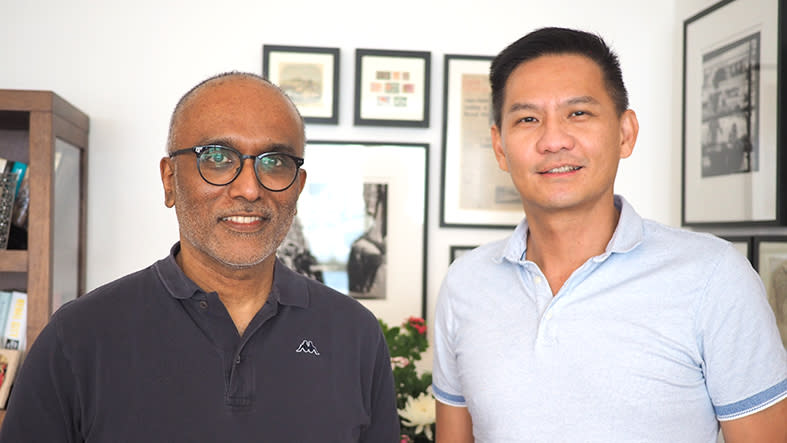PAP reform will benefit both party and Singapore, say academics in new book

LISTEN: Click the link above to hear our full interview with Singaporean academics Cherian George and Donald Low
SINGAPORE — An adaptive and internally reformed People’s Action Party (PAP) is in the interest of the ruling party and Singapore, say Singaporean academics Cherian George and Donald Low in their new book “PAP v PAP”.
In a lengthy interview on Yahoo News Singapore’s “On The Mic” podcast (link above), the duo explained what drove them to write the book – an anthology of essays on the Singapore government and politics – as well as the message they are trying to get across to readers.
“The immediate impetus for this particular work was the sense that it can’t be business as usual in Singapore for a number of reasons,” said Prof George, a professor of media studies at Hong Kong Baptist university.
He cited the disruptions caused by the COVID-19 pandemic and signs that Singapore’s model of governance “needed a revamp” as reasons why he and Prof Low put their heads together to write the book.
“What the pandemic has shown...is that you can’t just rely on a small group of technocrats or elite officials to guide the country. And you really need to complement the strong state with what scholars call a strong society,” said Prof Low, a professor of practice in public policy at the Hong Kong University of Science and Technology.
“And that usually comes from having institutions that tap on a wider pool of talent; it calls for institutions for democratic participation and engagement,” he added.
Competing impulses
Prof George and Prof Low noted that while the PAP has the capacity to change, it has to overcome its biggest challenge: itself.
“We do think that what is actually holding back the PAP...is within its own mind. It has choices to make that can decide whether the PAP continues to be the lead movement in the Singapore story or whether it’s going to degenerate into mediocrity and (become) just another party,” said Prof George.
He noted that the book is not about a split between individuals in the PAP but about the underlying tensions within the party about approaches to governance.
Prof Low said that they also tried to highlight the contest between “at least two impulses” within the party: that of being an elite, expert-led government versus the party’s “very strong authoritarian, hegemonic (and) sometimes majoritarian tendencies”.
“What is in the PAP’s own long-term interests is for its adaptive capacity to come to the fore, to take charge, rather than to succumb to...the lure of resorting to hardball authoritarian methods.
“Because in the long run, that is what is going to cause polarisation and division in Singapore,” he added.
Prof George said that while some of the ideas raised in the book may seem provocative to some, he added that both writers believe that they are not “beyond the pale for a national movement that has always prided itself on taking a broad church approach to government and politics”.
“The fact that we have to expect the government or some of its supporters to feel that the ideas we’re presenting are somehow radical is itself a worry to us. Because a society that is as well developed, as well-educated as ours, should be comfortable with a range of ideas,” said Prof George.
He added that he expected more resistance to the book’s ideas from the anti-PAP crowd who are convinced that the party is “beyond hope” and incapable of change.

Sceptical, not cynical
On whether the PAP has shown signs of its openness to change – especially in the wake of the 2020 General Election (GE), when the party lost the most number of seats since independence – both academics said they were sceptical, but not cynical, of the prospect.
Prof Low pointed out that that the early signals “were not encouraging”. “If you look at the last couple of months, things are not well with the criminal justice system; things are not well with the way the party tends to go after its critics and dissenters,” he said.
On the bright spots following the GE, Prof George said that the appointment of Workers’ Party (WP) chief Pritam Singh as Leader of the Opposition was significant as it gave recognition to the Opposition’s role in Singapore’s democratic system.
Prof Low added that he has been very impressed by the performance of the fresh opposition faces in Parliament, naming the Progress Singapore Party’s Leong Mun Wai and Hazel Poa – both Non-Constituency Members of Parliament – as examples.
With more diversity in voices, more ideas have been raised in Parliament, said Prof Low, who cited the example of WP’s Jamus Lim, who prompted a spirited debate among MPs over his minimum wage proposal.
“I’m actually not for a minimum wage but that’s not the point, right? The point is that the idea deserves deeper study, deserves an evidence-led debate,” said Prof Low.
Stating how increased competition would actually help raise the standards of PAP MPs, Prof George turned to a football analogy.
“A Liverpool that had to win the championship by competition with Manchester City is a superior club than it would have been if its competition was Tranmere Rovers. It’s not a zero sum game.
“If you wish well for Singapore, you should be hoping that the PAP ups its game. And PAP supporters should be hoping that the opposition is allowed to up its game,” said Prof George.
“PAP vs PAP” is available for pre-order here.
Stay in the know on-the-go: Join Yahoo Singapore's Telegram channel at http://t.me/YahooSingapore
More Singapore stories:
Orchard Towers death: Natalie Siow gets 5 months' jail
18-year-old involved in knife attack at Boon Lay supermarket charged in court



